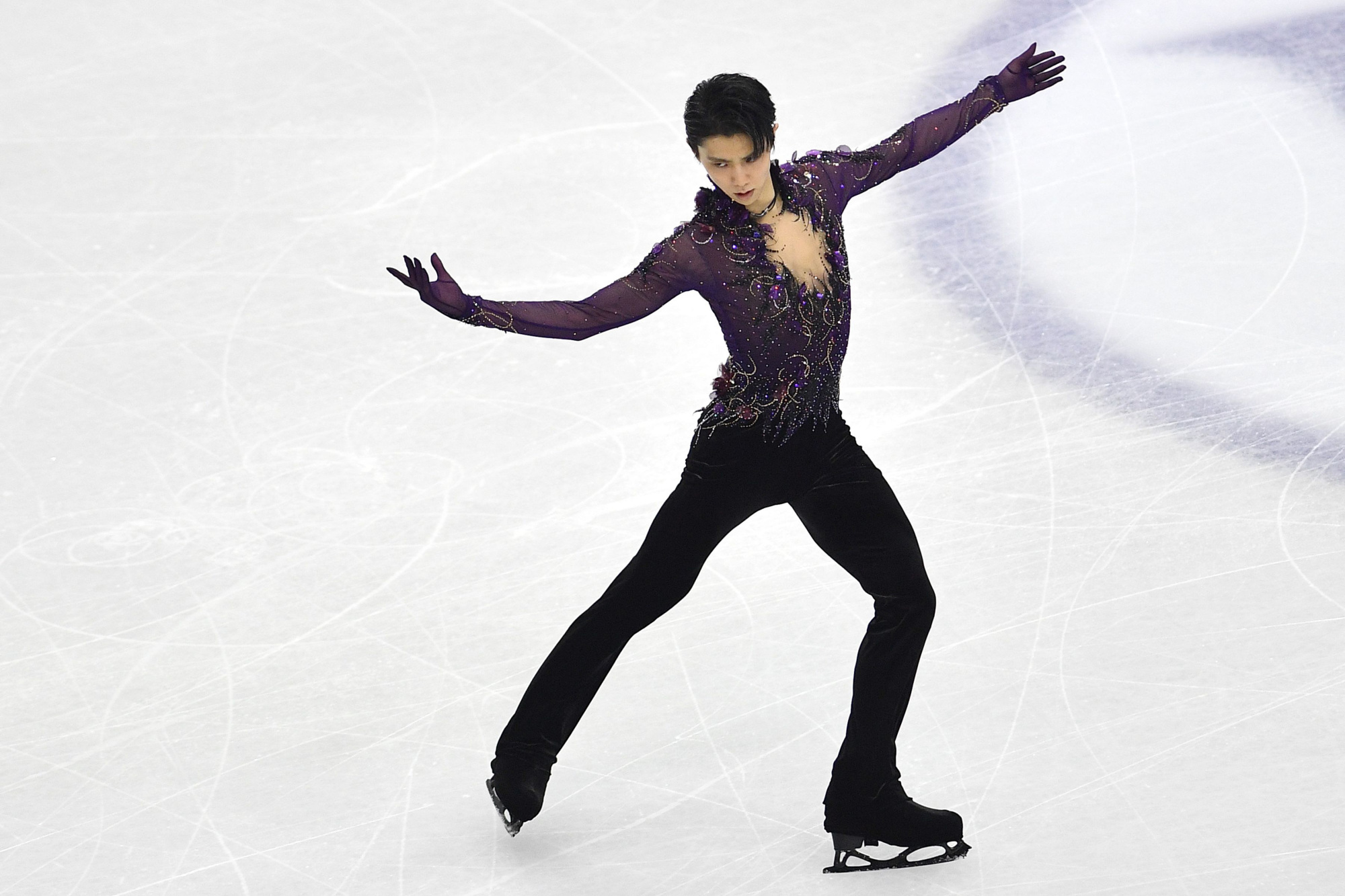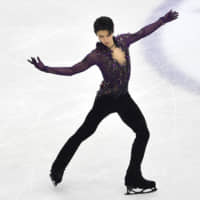Yuzuru Hanyu incurred his largest defeat in more than 10 years at the Grand Prix Final on Saturday to American Nathan Chen.
Despite a super effort in his free skate to "Origin," Hanyu lost by nearly 44 points to the two-time defending world champion on one of the biggest stages of the season.
The last time Hanyu finished that far back of the winner was as a 14-year-old in 2009 at the world junior championships, where he was 12th behind victor Adam Rippon.
Chen and Hanyu both landed five quadruple jumps in their free skates, but mistakes by Hanyu in both programs ended up proving costly. After not completing his combination jump in the short program to "Otonal," Hanyu entered the free skate nearly 13 points behind Chen.
The 20-year-old Chen, who won the GP Final for the third straight year, was impressive in victory, setting world records in both programs. Chen, who is unbeaten since the Pyeongchang Olympics, has now defeated Hanyu five straight times in head-to-head competition.
"It felt amazing. I got pretty gassed at the end of my program ('Rocketman'), so I guess I need to work on my stamina a little bit, but overall I'm really happy to be here," Chen said. "I'm really thrilled with the score.
"It's awesome experience and exposure for me to be able to compete against these amazing guys and every time it's a lot of fun for me, so I'm happy to be here and excited to keep moving forward."
Chen's winning total of 335.30 points was more than 12 points better than Hanyu's season-high of 322.59 (set in his win at Skate Canada in October).
So what to make of their most recent matchup?
Was it the passing of the torch to a new generation or just an anomaly?
It would be hard to argue for the latter, as it appears that a pattern has developed.
The question is: If they both skate cleanly, can Hanyu still win?
Ice Time believes he still can, but the margin for error is now miniscule.
I don't think fans of either skater should overreact to this result. As legendary skating writer Phil Hersh wrote in his recap of the event, "these two guys are in a solar system by themselves."
Meaning that on any given day, either could prevail.
Many were hoping that in Italy both would skate their best, but that went out the window with Hanyu's mistake in the short program on Thursday.
The next morning, Hanyu worked on a quad axel in practice, an indication that he might try to include it in his free skate to make up the deficit with Chen.
Though Hanyu did not attempt a quad axel, he still landed a beautiful quad lutz for the first time in competition in the free skate.
Considering that he was seriously hurt during practice at the NHK Trophy in 2017 while attempting a quad lutz, the fact that he challenged and mastered the jump is a testament to the two-time Olympic champion's character and fortitude.
"I'm really satisfied that I could land the clean quad lutz in my program," Hanyu stated after his free skate. "I'm also happy about the quad loop. I also felt the connection with the audience.
"I'm satisfied with the first half of the program, but regret about the second half," Hanyu continued. "I was too tired in the end that I wasn't able to hang on to the ending pose. I want to be better. Nathan makes me stronger and makes it more fun to skate."
After Hanyu's fantastic free skate, ISU announcer Chris Howarth wondered on the YouTube feed of the event if the Sendai native had established another world mark, despite singling a planned triple axel.
"What about that performance by Yuzuru — five quads included in the program," commented Howarth. "Could that be a world record? I think it may well (be).
"The highest score for the free is 216.02. The overall world record score is 323.42 and Nathan Chen is the holder of both of those scores," Howarth added. "I think that free skate score is going to blow it out of the water."
Hanyu's free skate tally of 194.00 did not set a record, but it brought up another issue — judging. Chen outscored Hanyu by 2.14 points in program components in the free skate for the first time ever head-to-head. This certainly raised the eyebrows of many.
Fans were seen at Sunday's Gala Exhibition holding up signs saying, "Unfair judgement," indicating their displeasure with Hanyu's scores. After learning of this, and seeing similar comments online, Ice Time (@sportsjapan) posed the question of whether or not Hanyu was judged fairly in a Twitter poll on Sunday night.
In the first 24 hours after it was posted, more than 20,000 people had voted and 86 percent of those who cast ballots believed Hanyu had been scored unfairly.
The next possible meeting between Hanyu and Chen could come at the Four Continents Championships in February in Seoul. If they do battle there, you can be certain that Hanyu will come with all the weapons in his arsenal to try and re-establish himself as the top skater in the world.
Chen was magnanimous in victory on Saturday, saying of Hanyu, "Even today, he is kind of a skating god for me."
Sato captures JGP title
The best news out of Turin came in the Junior Grand Prix Final, where Shun Sato put on a stunning show in the free skate to move up from third place after the short program to win the title decisively.
Sato's winning total of 255.11 put him atop the medal stand ahead of Russia's Andrei Mozalev (241.48) and Daniil Samsonov (230.19).
The 15-year-old from Sendai put on an incredible show of speed and power in his free skate to "Romeo and Juliet," cleanly hitting three quads and six triples.
"I was very surprised at the points, I was not expecting such high points, but the reason was probably because of the quad lutz, and because I was able to do all spins and steps 100 percent," Sato said after his victory.
ISU JGP announcer Ted Barton recognized the phenomenal outing by Sato in his commentary.
"Unbelievable, amazing. That was the performance that every athlete trains for," Barton said. "Not a foot out of place. Perfectly planned, perfectly trained for, perfectly executed. Those kind of performances may only come in a lifetime a few times."
As Barton analyzed the replay of Sato's elements, he was stunned by what he saw.
"Look at the height on the quad toe — ridiculous. He had time for five revolutions probably," Barton stated. "He was not going to be distracted or disturbed by anything. He just went into the program. Every jump executed to his top quality."
Of Sato's short program to "Arrivee des Camionneurs," Barton was equally effusive in his praise.
"He carried such beautiful speed and flow into and throughout the air and on the landings. That's quality," Barton commented. "The skating skills of all the Japanese skaters, the highest level. Great security as they perform."
Sato, who was second behind Yuma Kagiyama at the Japan Junior Championships last month, has huge potential. He is still a bit of a raw talent at this point, but if he moves to an elite coach in the future, he could achieve some amazing results.
Kagiyama, who seemed a good bet for a medal at the JGP Final, settled for fourth after struggling in his short program.
Both Sato and Kagiyama will be in the running for medals at the Japan Championships next week in Tokyo.
No repeat for Kihira
Last year's GP Final women's champion Rika Kihira came in a disappointing fourth this time around behind Eteri Tutberidze's trio of Alexa Kostornaia, Anna Shcherbakova and Alexandra Trusova.
Kihira was sixth after the short program after falling on her combination jump, but moved up to fourth with a strong free skate that included a quad salchow. Kihira fully rotated the jump but fell on the landing.
Three-time U.S. champion Johnny Weir, commenting on the NBC telecast, praised Kihira for trying the maneuver and for her perseverance.
"It's so difficult to put an element out for the first time in such a big competition," Weir noted. "This is the first performance where I have really seen Rika dig deep and fight for every single element, give nothing away."
Weir's fellow analyst Tara Lipinski also saluted Kihira for her free skate to "International Angel of Peace."
"I enjoyed that free skate so much artistically," Lipinski remarked. "I love the style of it, I love her music. I love the way she skates to it and, technically, that was a risky program."
Kihira (216.47) finished more than 30 points behind winner Kostornaia (247.59), and over 16 points behind Trusova (233.18) for third in Italy.
It is clear that Kihira is going to have to significantly up her game to get on the podium against Eteri's youngsters going forward.

















With your current subscription plan you can comment on stories. However, before writing your first comment, please create a display name in the Profile section of your subscriber account page.